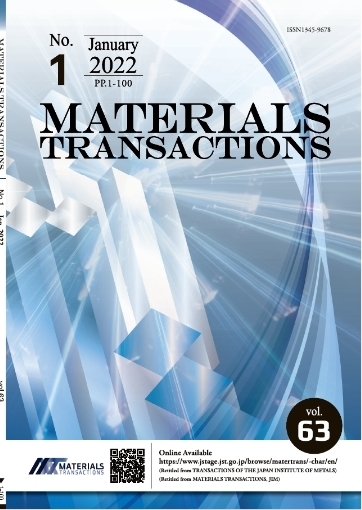Composite Materials based on Light Elements for Hydrogen Storage
Takayuki Ichikawa, Nobuko Hanada, Shigehito Isobe, Haiyan Leng, Hironobu Fujii
pp. 1-14
Abstract
In this paper, we review our recent experimental results on hydrogen storage properties of light elements Li, C and Mg based nano-composite materials. The results are summarized as follows: In the Li-N-H system, such as the ball milled 1:1 mixture of Li amide and Li hydride containing a small amount of TiCl3 (1 mol%), a large amount of hydrogen (∼6 mass%) is absorbed and desorbed in the temperature range from 150 to 250°C with good reversibility and high reaction rate. Furthermore, in the ball milled mixture of 3Mg(NH2)2 and 8LiH, ∼7 mass% of hydrogen is reversibly stored in the temperature from 140 to 220°C, indicating one of the suitable hydrogen storage materials. In graphite containing a small amount of nanometer sized Fe (∼2 at.%), a large amount of hydrogen (∼7 mass%) is chemisorbed by ball milling for 80 h under less than 1 MPa of H2-gas pressure. However, the chemisorbed hydrogen capacity decreases with increase in the milling pressure for the 80 h ball milled graphite (down to ∼4.1 mass% at 6 MPa), while the physisorbed hydrogen capacity in graphite increases with increase in the milling pressure, reaching up to 0.5∼1.0 mass% at 6 MPa. Unfortunately, the desorption temperature of chemisorbed hydrogen is higher than 300°C. Therefore, some break-through is necessary for the development of carbon-based materials as one of the hydrogen storage systems. On the other hand, some nano-composite Mg catalyzed by Ni nano-particle or Nb oxide reveals superior reversible hydrogen storage properties: ∼6.5 mass% of hydrogen is reversibly stored in the temperature range from 150 to 250°C. Especially, the Nb metals uniformly dispersed in nanometer scale on the surface of MgH2, which was produced by reduction of Nb2O5, is the best catalyst we have studied so far. Thus, it seems that some Mg nano-composites catalyzed by nano-particles of d-electron transition metals is acceptable for practical applications.










